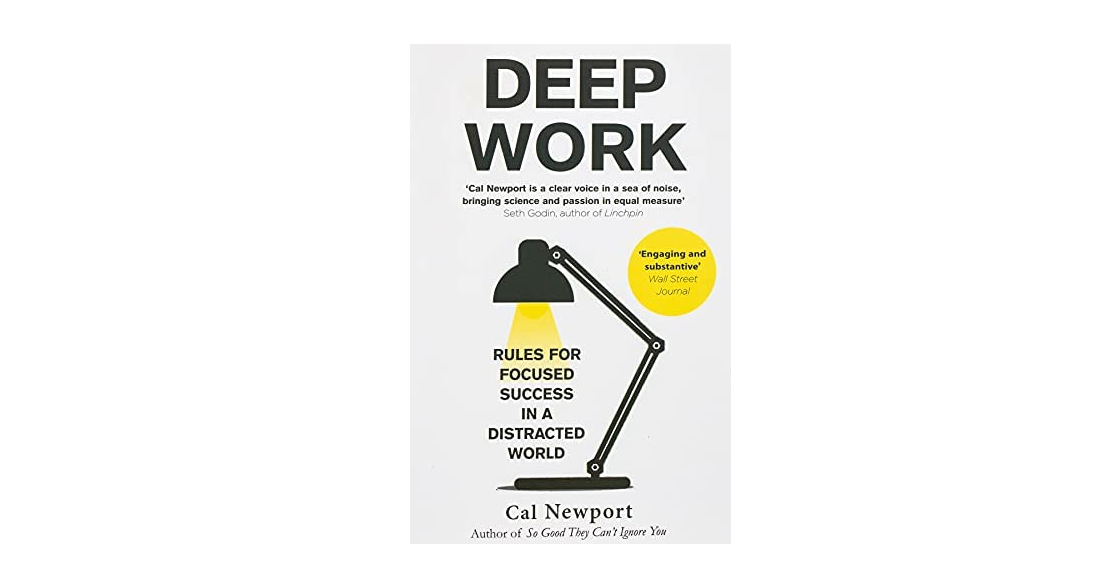
“Deep work” was invented by Cal Newport in his book Deep Work: Rules for Focused Success in a Distracted World. It refers to the capacity for concentrated, high-quality cognitive activities demanding deep focus, creativity, and problem-solving. Crucially, deep work is a skill. It will be difficult initially, but it will improve and become easier to engage in over time and with practice.
In Cal Newport’s book, he analyses the subject across two sections. In the initial part, he explains the theoretical framework for deep work and explains its significance. He builds his argument on three key points: the value, rarity (稀有), and meaningfulness of deep work. He uses examples of how deep thinking benefited people from all works of life. In the book’s second section, Newport provides a roadmap for achieving deep work. He suggests four key principles that facilitate its realization: engage in deep work, embrace boredom, abandon social media, and remove unnecessary tasks.
Cal Newport currently works as a professor of computer science at Georgetown University. His career contains a large number of publications, with over 50 handwritten documents all related to computer science. Beyond his academic pursuits, Newport manages a website named “The Deep Life,” which focuses on topics on deep work.
While deep work is highly productive and can lead to significant accomplishments, there are considerations to keep in mind.
▲Some people can sustain deep work for longer periods, while others may find it more effective to shift between deep work and other tasks.
▲Regular breaks, rest, and recovery help prevent tiredness and allow you to return to deep work sessions with renewed focus.
▲The amount of time one can sustain deep work can vary based on factors such as task complexity, familiarity with the subject matter, and individual preferences.
▲It’s not necessary or sustainable to engage in deep work all day. Balanced work routines that include a mix of deep work, shallow work, and breaks are often more effective in the long run.
1.What doesn’t characterize deep work according to Cal Newport?
A Intense focus.
B Creative thinking.
C Problem-solving ability.
D Passive thinking.
解析:选D。D细节理解题。根据第一段可知,卡尔·纽波特在他的书籍《深度工作》中创造了“深度工作”一词,指的是注意力高度集中、认知能力达到极限的工作状态,需要深度专注、创造力和解决问题的能力。由此可知,“深度工作”的特点并未提及被动思维。故选D。
2.What’s the second paragraph mainly about?
A A deep work summary.
B Deep work by Cal Newport — the book.
C Creating a deep work schedule.
D Key principles of deep work.
解析:选B。B段落大意题。根据第二段内容可知,第二段主要介绍了卡尔·纽波特如何在他的书籍《深度工作》中分析“深度工作”的。结合选项可知,B项最符合题意。故选B。
3.What can we know about Cal Newport?
A He is a university programmer professor.
B He created a website about deep life.
C He has rich academic achievements.
D He is skilled in deep work.
解析:选C。C细节理解题。根据第三段可知,卡尔·纽波特是一名大学计算机科学的教授,并不是大学程序员教授;他管理一个名为“深度生活”的网站,该网站专注于深度工作方面的话题,并不是关于深度生活的话题,且并未提及他创建了该网站;文章未提及他擅长深度工作。他出版了大量出版物,超过50份手稿都与计算机科学有关,由此可知,他学术成就丰富。故选C。
4.What should we do to focus on success for our practice?
A Keep deep work as long as possible.
B Take time to relax occasionally.
C Mix deep work with shallow work.
D Give priority to simple boring work.
解析:选C。C推理判断题。根据文章最后一部分提到的提高深度工作的效率需要牢记的几点可知,定期休息有利于防止疲劳,故A、B错误;一个人能够持续深度工作的时间可能会因任务复杂性、对主题的熟悉程度以及个人喜好等因素而有所不同,由此推断应先完成自己感兴趣的复杂任务,故D错误;平衡的工作习惯(深度工作、浅层工作和休息)往往更有效。故选C。